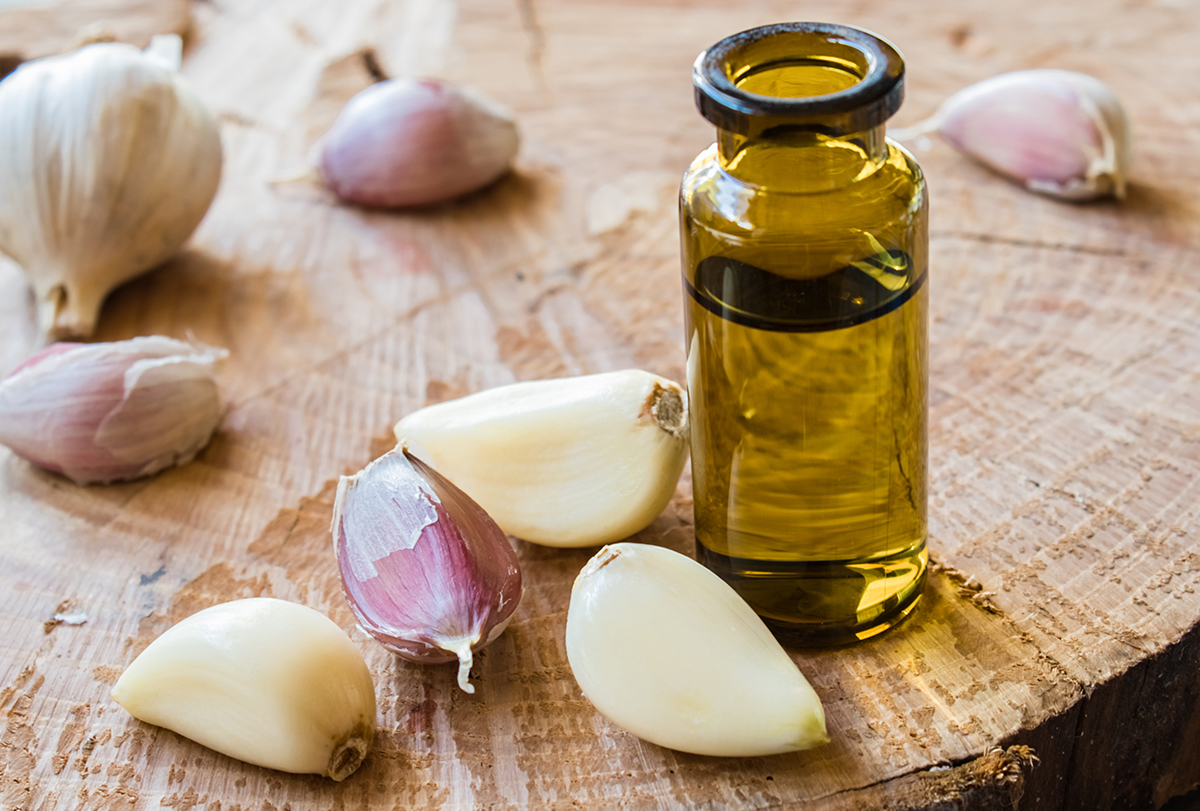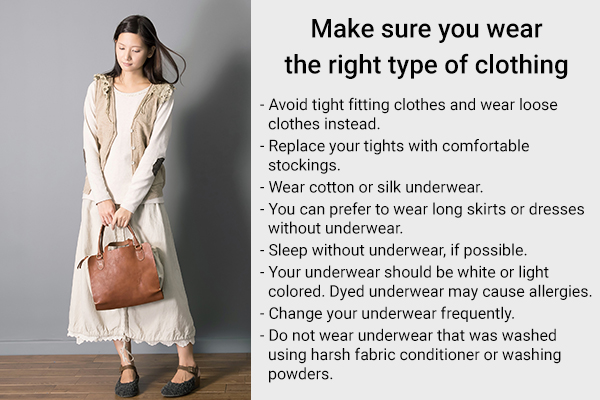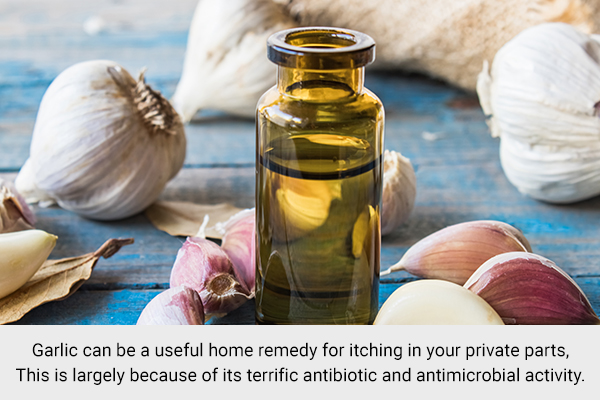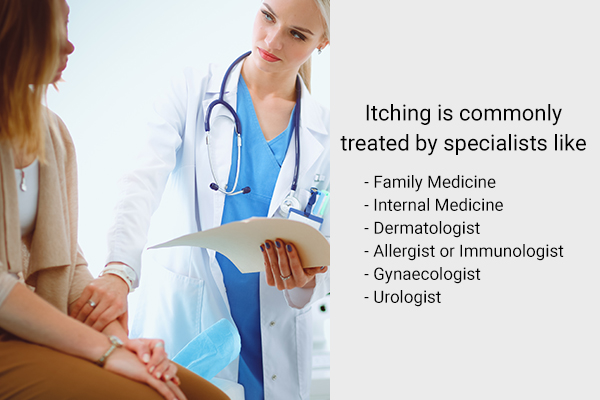In this article:
Itching in your private parts can be an uncomfortable topic to talk about, but what you should know is that it’s a very common condition, especially in women.

Itchy genitals are most of the time a symptom or sign of an underlying problem. Some commonly noted reasons behind this problem include: (1)
- Yeast infection
- Irritants
- Bacterial vaginosis
- Menopause
- Skin diseases
- Vulvar cancer
- Sexually transmitted diseases
- Improper personal hygiene
- Allergy to synthetic clothing
If you are struggling with itching in your private parts, it’s time to learn how to manage it. In the majority of cases, you can deal with this problem at home. There are numerous useful and easy home remedies to treat genital itching.
Home Remedies for Itching in the Private Parts
The following measures can help get rid of itching in the genital area.
1. Maintain a proper personal hygiene
Ensuring good personal hygiene is a requirement to prevent itching in the private parts. Proper hygiene will discourage dangerous microbes from thriving in the genital area and causing any yeast or bacterial infection. (1)(2)(3)
Observe these practices to maintain proper intimate hygiene:
- Change underwear frequently.
- Wipe front to back after using the restroom.
- Change tampons and sanitary pads frequently.
- Clean the vulva before and after intercourse.
- Do not cleanse the vulva vigorously.
- Use a safe method of pubic hair removal.
- Avoid feminine hygiene products that contain fragrances.
- Avoid using colored toilet paper.
- Avoid wearing nail polish if you tend to scratch your skin.
Cleanse your vulva daily
Select a carefully developed and clinically tested vulvar wash that delivers the targeted antimicrobial action and other health benefits without any side effects or a negative impact on the healthy vulvovaginal microbiota. (1)
Remember:
- Cleanse your vulvar area only once daily.
- Just use your hand to clean the vulvar area.
- Gently pat the area dry and avoid using sponges.
Note: Do not go overboard with cleansing your vulvar region as excessive cleansing of the vulvar skin may contribute to irritant dermatitis, which causes itching. (2)
2. Wear the right type of clothing
Wearing clothes that do not aggravate your itching in the private parts is crucial. Remember these points when choosing the clothes you wear daily to prevent vulvar itching: (1)

- Avoid tight-fitting clothes and wear loose clothes instead.
- Replace your tights with comfortable stockings.
- Wear cotton or silk underwear.
- You can wear long skirts or dresses without underwear.
- Sleep without underwear, if possible.
- Your underwear should be white or light colored. Dyed underwear may cause allergies.
- Change your underwear frequently.
- Do not wear underwear that was washed using harsh fabric conditioner or washing powders.
3. Do not give in to extensive pubic hair removal for aesthetic reasons
Excessive pubic hair removal, which was commonly only done due to traditional and religious reasons, has become an everyday thing for aesthetic purposes.
Pubic hair removal may cause skin microtrauma or transfer of infectious agents throughout the pubic region. Other serious outcomes may involve vulvovaginal irritation, bacterial infection, and the spread of venereal diseases, all of which can cause itching.
In a study done on pubic hair removal methods, over 50% of the women documented removing all pubic hair, with the majority of them experiencing one or more issues.
Pubic hair acts as a physical barricade for the vulvovaginal area, and therefore, its full removal could cause a vulnerability to infections. So, if you suffer from private part itching, you may want to cut back on pubic hair removal. (1)
4. Choose the right products during your menstrual cycle
In a study done on 500 women, poor menstrual and vaginal hygiene practices were largely associated with bacterial vaginosis.
Similarly, data from a home survey uncovered that women who used unsanitary methods during menstruation such as things other than a sanitary pad or locally prepared napkins were more prone to reproductive tract infections, abnormal vaginal discharge, itching, and vulvar irritation.
This underlines the necessity for safe and hygienic methods for women worldwide during the menstruation period. Another research advised the use of tampons over sanitary pads during menstruation and also to change tampons and sanitary pads frequently. (1)(2)(4)
5. Rinse your private parts with a boric acid solution
A white powder or crystal, boric acid is a water-soluble compound comprising hydrogen, oxygen, and boron. It exhibits antifungal properties and can be effective in managing yeast infections that cause intense itching in intimate areas.
In a review of various studies published in the Journal of Women’s Health, specialists suggest that boric acid is a safe and affordable alternative for women with recurrent and regular symptoms of vaginitis such as itching. (5)(6)
How to use boric acid topically for vaginal itching:
- Mix ¼ teaspoon of boric acid in a cup of water.
- Rinse your genitals with this solution.
- Do this twice daily till the itching resolves.
Note: Boric acid should be used with caution on the vagina as it can cause irritation and discomfort if used improperly or in excessive amounts.
6. Apply garlic oil to the affected area

Garlic can be a useful home remedy for itching in the private parts due to its terrific antibiotic and antimicrobial activities.
A 2005 study published in Antimicrobial Agents and Chemotherapy shared that fresh garlic extract has antifungal action against C. albicans biofilms. Moreover, a study published in the Avicenna Journal of Phytomedicine illustrated the medicinal value of garlic in fighting different microbial infections that may cause itching. (7)(8)
Finally, a study made known in the Iranian Red Crescent Medical Journal established that garlic could be an eligible alternative for metronidazole in dealing with bacterial vaginosis that contributes to itching. (8)
How to use garlic topically for vaginal itching:
- Dilute garlic oil with vitamin E oil.
- Apply the mixture to the affected area.
- Wait for 10 minutes before rinsing it off with water.
- Do this twice every day for a few weeks.
Boric acid capsules are also available for vaginal insertion, and you should use them only as directed by a healthcare provider.
Note: You can also chew three raw garlic cloves every day.
7. Use Greek yogurt on your vagina topically
Greek yogurt is a probiotic, so it contains bacteria, such as lactobacillus, that are important for creating a healthy atmosphere in your vagina. Therefore, it can help deal with microbial growth in your genital regions and help maintain the right pH there.
A 2006 study suggested that lactobacilli can effectively colonize the vagina and prevent vaginal infection or colonization by C. albicans when administered orally or intravaginally. (9)
Another 2012 study reported the usefulness of yogurt in treating the symptoms of bacterial vaginosis. (10)
How to use yogurt for vaginal itching:
- Soak a tampon in raw Greek yogurt.
- Insert it into your vagina and leave it on for 2 hours
- Do this twice daily for benefits.
Caution: It is important to use only plain yogurt as yogurt with added sugar can exacerbate the infection and its symptoms by promoting the growth of yeast.
8. Apply aloe vera to the affected area
As women age and go through menopause, the tissue in the vagina can become thinner and more easily damaged, causing a condition called atrophic vaginitis.
This can lead to uncomfortable symptoms such as itching, burning, and painful intercourse.
Research has shown that using an aloe vera vaginal cream can help improve the health of the vaginal tissue and relieve these symptoms. It could be a safe and natural way to find relief. (11)(12)
Most-Asked Questions About Genital Itching in Females
Is vaginal itching common in pregnancy?

Pruritus is the leading dermatological symptom in pregnancy, since it is a period in a female’s life when the hormones are fluctuating a lot. (13)
Does menopause cause pruritus?
Due to the decline of estrogen secretion in menopausal women, vaginal pH rises, activating proteinase-activated receptor-2 (PAR-2), which is a prominent itch mediator. (13)
How long will I have genital itching?
The duration of genital itching depends on what’s causing the itch. You can ask your healthcare provider for a proper diagnosis.
What are sexually transmitted infections (STIs) and can they cause itching?
STIs or STDs are sexually transmitted diseases caused by various microorganisms, with different sizes, symptoms, and treatments. Yes, STIs, such as trichomoniasis, genital herpes, and warts, can cause itching, along with other symptoms.
What types of doctors treat itching?
Itching is commonly treated by specialists such as:

- Family medicine physician
- Internal medicine specialist
- Dermatologist
- Allergist or immunologist
- Gynecologist
- Urologist
What aggravates itchy genitals?
Many things can aggravate genital itching such as:
- Tight clothing
- Certain soaps and detergents with fragrance or preservatives
- Certain female hygiene products
- Various allergens
- Topical medicines such as steroids
- Uncontrolled diabetes
Can condoms cause vaginitis?
If you’re allergic to latex, the use of condoms can cause an allergic reaction, which causes itchiness in the vaginal region after sexual intercourse.
Are antibiotics effective in vaginal itching?
Antibiotics will only work for vaginal itching caused by a bacterial infection.
Final Word
There are many useful home remedies for vaginal itching, frobm Greek yogurt to observing proper personal hygiene. Some of these remedies may perform better than others for you.
Avoid douching and other remedies that are not supported by experts. If you have any uncommon or severe symptoms, see your doctor.
 Continue ReadingGenital Itching in Women: Causes, Risk Factors, and More
Continue ReadingGenital Itching in Women: Causes, Risk Factors, and More
- Was this article helpful?
- YES, THANKS!NOT REALLY


